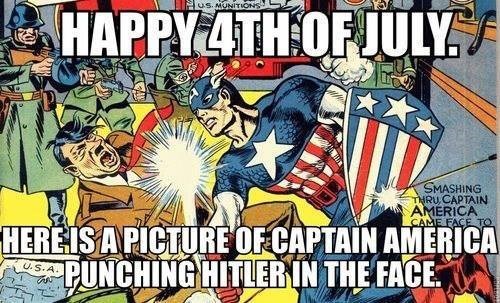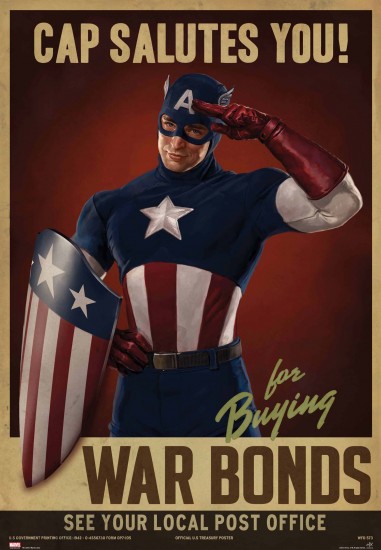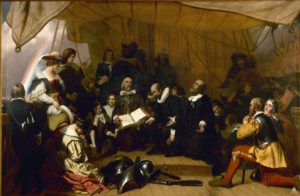The Empire Slides Back
Once upon a time there was a mighty empire. It began when many of its citizens fled from the oppressive rule of an evil king, or a slightly irksome king, depending on how you see it.
When first citizens landed on this future empire’s shores, they wanted to have a different sort of empire. Many of them wanted it to be built on the principles and even specific faith of their most holy book. One religious leader said the new empire is like a “city on a hill.”
Years passed. The empire grew, thanks in part to the holy book’s principles and even faith, yet with room for other holy books and principles — and with plenty of room for mistakes.
When at last the empire tore away from the king’s rule, it grew all the more. Enterprising citizens asked, What if?, and pushed into strange new worlds. With all their worldly goods they became pioneers, and crossed into controversial territory where dwelt many hostile natives who cried out that this columnist is glossing over a nastier part of American history.
Also among those natives dwelt tribal chiefs, claiming in quite un-stereotypical dialogue:
How! How is it that this topic hath anything to do with speculative fiction, forsooth?
It doth strongly relate, because of this truth:
How we see our world-story and our nation-story affects other stories.1
 Resuming then with the national story’s controversial pioneer phase — simultaneous with the equally controversial Civil War phase — we quickly skim toward the still-youthful nation’s involvement in two worldwide wars. It was a great period of history, almost an Old-Testament level of righteous warfare: good Western heroes versus Nazis, literally.
Resuming then with the national story’s controversial pioneer phase — simultaneous with the equally controversial Civil War phase — we quickly skim toward the still-youthful nation’s involvement in two worldwide wars. It was a great period of history, almost an Old-Testament level of righteous warfare: good Western heroes versus Nazis, literally.
Captain America punched Adolf Hitler smack on his greasy jaw, and set free the captives.
… Leading other captives to begin wondering: excuse me, what about my freedom too?
… Leading, in turn, other folks who also think themselves captives — to the old world-story and its founding mythologies — to seek what they believe to be similar freedoms.
… Leading, at last, defenders of the Biblical world-story and mythology to point back to those already-mythologized histories, in which brave men and women sailed in ships to a new world, where they stepped freely across the treacherous terrain of readers’ inevitable colonialism critiques, and sought to establish their City On A Hill. Now in their hour of need, Biblical defenders cry out to their God, using “city on a hill” quotes and often 2 Chronicles 7:14, to suggest that if only this empire repents from its backsliding, God will restore its greatness and put a stop to those whose claims of “freedom” will lead to spiritual dystopia.
That’s the nation-story, per evangelical-Christendom. Now we stand at a crossroads.
The back-cover copy to this evangelical thriller novel would say: Will the brave hero, our handsome, brooding Christian Nation, do the right thing, or surrender to his evil enemies?
Ah, but like any good hero, handsome/brooding or otherwise, Christian Nation has flaws.
Here is a partial list:
- Poor theology. The “city on a hill” metaphor and other comparisons are not about a particular new nation, but about Christ’s Nation-of-nations, the Church, His Kingdom.
- Also, it’s a real stretch to apply the promise of 2 Chronicles 7:14 to America or any other nation except the nation of Israel, at that time, in that place. Do evangelical Christians read Scripture literally, that is, as it was meant to be read, or read it like “liberals”? If we fall into the latter practice, even For a Good Cause, our world-story loses credibility.
- Those aforementioned controversial territories, including racism and other bigotry.
To concede these internal flaws is not the same as denying the hero is a true hero.
And no, I don’t suggest our nation-story needs a gritty reboot. Instead we must roll back the old sentimental reboot, and especially the Biblical world-story revision.
With reminders that Christ’s World-Story overrules our own Nation-Story, we may actually be set free to enjoy our nation and its exceptional tenets even more. We don’t have to suffer personal remorse over other Americans’ sins, or even give heed to the peddlers of other guilt-based world- and nation-stories who claim someone did this sin, but somehow you are also at fault, so repent and do this penance and the gods will forgive you.2 It encourages us to recall that Christ will redeem nations for His Kingdom.3
These reminders also set free our own stories. Lifting eyes beyond our great nation to the far greatest Nation-of-nations that Christ is building will widen our vision. It discourages a world-story that focuses on America, using His Story as spare parts for our story.4 And this reminder endorses exploration of other times and fantastic places, asking those same questions asked by the American pioneers, imitating our Creator: Could we go here? Could we create this? What if … ?
- For our excellent series exploring our nation’s story and speculative stories, see Speculative Politics from last fall, featuring novelists Kerry Nietz and Marc Schooley. ↩
- Isn’t it fascinating that the same people who object to “Adam’s sin infected the whole human race” will easily accept “your forefathers’ racism and environment-abuse sins infected the whole nation”? ↩
- Rev. 21 says kings, and surely also presidents, will bring their glories into the capital City of New Earth. ↩
- In this fantastic interview, theologian Peter Leithart distinguishes between true Biblically based patriotism and Christian-flavored “Americanism.” ↩










































And I found nothing to make WTF-face about (…for now). Well done, Burnett.
Thank you … I think!
Captain America is my favorite Avenger (Granted, I’ve only seen the movies,) because he does focus one what’s good in our nation, instead of over-emphasizing our flaws
My mother lives in Virginia after a long nomadic life on three continents. Through her I have been forwarding these essays on American Evangelism to her bible study group. Your comments are well received and I hope will stir some bustles! Thank you for the sane counter voice to the razzle dazzle.
Thanks for your encouragement, Henrietta.
I’m curious: to which essay(s) are you referring, besides this one?
I like this.
Either way, humanity is quite open to the idea of a sinful “federal head,” aren’t we?
The main difference is between proposed solutions. Other religions say, “Do this good deed to make up for original sin, and ye shall be saved.” The other says, “Believe on the Lord Jesus Christ, and you will be saved” (Acts 15:31).